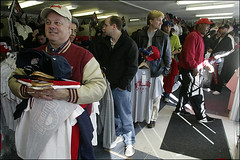Baseball, hot dogs, apple pie, and profits...
 Clearly a new stadium is worth hundreds of millions of dollars to the Washington Nationals baseball team. Will the City of Washington benefit from the "investment" made in the stadium as the city receives little return in the way of profit-earning "equity." Washington Post graphic.
Clearly a new stadium is worth hundreds of millions of dollars to the Washington Nationals baseball team. Will the City of Washington benefit from the "investment" made in the stadium as the city receives little return in the way of profit-earning "equity." Washington Post graphic.Today's Post has an article, "Analysis Predicts Stadium Windfall," about the results of a market study on the Washington Nationals baseball team, commissioned by DC's Chief Financial Officer Natwar Gandhi.
Why wasn't such a market study conducted before "negotiations" between the City of Washington and Major League Baseball commenced?
Such would have given the City much more negotiating leverage vis-a-vis baseball...
While such studies tend to be pretty speculative and often don't pan out to the extent projected (cf. DC's City Museum, or the opening of the Discovery Zone store or the various anchor restaurants in the MCI Center), the findings are still interesting. According to the Post article:
The Washington Nationals could generate $203 million in revenue during their first season in a new stadium, according to a District-commissioned report that includes projections that would make the franchise one of the richest in Major League Baseball. Even after the initial excitement over the new stadium wears off, the Nationals can anticipate grossing $190 million from ticket sales, concessions and parking in the 2011 season and seeing that amount grow by 2.8 percent annually from there, said the report prepared by Economics Research Associates for D.C. Chief Financial Officer Natwar M. Gandhi.
If the projections are on target, the Nationals would probably rank behind only the New York Yankees and Boston Red Sox, the only franchises to surpass $200 million in total revenue last year, according to Forbes magazine, and on par with the New York Mets, Los Angeles Dodgers and Chicago Cubs. The projections greatly exceeded the expectations of city officials and MLB executives. And several baseball officials, who had not seen the report, expressed skepticism about the estimates when contacted this week.
It's baseball's job to play down revenues in order to maximize the amount of subsidy they can reap from localities.
It sure stinks that the Washington Nationals and Major League Baseball will earn these kinds of revenues at the expense of DC taxpayers and businesses and other uses in the area that were forced to move with little in the way of financial support to assist in the continuation of these businesses (such as the Washington Sculpture Center).
Yesterday's New York papers discussed the proposed new Yankees Stadium. New York's Mayor Bloomberg, like DC's Mayor Williams, is big on sports-related economic development--despite all the evidence to the contrary. (Question: is the area around the current Yankee Stadium thriving economically? We all know the answer to that.)
According to this article from the Times, "$28 Million for the Bronx in the Yankees' Stadium Plan," the New York Yankees will:
As part of the Yankees' proposal to build a new stadium, the team will contribute $28 million to a trust fund and distribute 15,000 free tickets each season to Bronx groups, according to the draft plan of a community benefits program. The proposal also calls for the team to pay $100,000 a year to maintain parks around the stadium and distribute $100,000 a year in "equipment and promotional merchandise" to schools and youth groups in New York City.
There was no requirement, however, that the $28 million, which would be distributed over a 40-year period, be spent in the South Bronx, the site of the stadium and its replacement.
Stadium opponents observed yesterday that the proposal for a 53,000-seat stadium calls for the trust fund to be administered by "an individual of prominence" appointed by an advisory group that would be selected by elected Bronx officials — who are nearly unanimous in their support of the stadium despite intense neighborhood opposition. "It would be like the fox guarding the henhouse," said City Councilwoman Helen Diane Foster, one of the few Bronx officials opposing the new stadium.
Sound familiar? Mor from the article:
Plans for an $800 million stadium on two public parks next to the present stadium have drawn antipathy in the neighborhoods around the stadium, where residents say the parks that will be paved over — Mullaly and Macombs Dam Parks — are vital to a community with a high rate of childhood asthma and a lack of green space. The parks would be replaced by smaller parks scattered throughout the area, including some on the rooftops of garages that would be built for stadium parking.
The stadium's neighbors say the Yankees have done little outreach in the community, which is among the poorest in the nation. Many residents say they are particularly estranged from the team because they cannot afford tickets but have to put up with traffic and noise on game days.
 Putting money in the pockets of Major League Baseball or "Lining up to buy 'laundry'" a la jerry Seinfeld. Photo: Tony Bardo of Burke, Va. waits at the front of the line at the Nationals team store with hats, t-shirts and pennants. Credit: Jonathan Newtown, The Washington Post.
Putting money in the pockets of Major League Baseball or "Lining up to buy 'laundry'" a la jerry Seinfeld. Photo: Tony Bardo of Burke, Va. waits at the front of the line at the Nationals team store with hats, t-shirts and pennants. Credit: Jonathan Newtown, The Washington Post.Index Keywords: stadiums-arenas



0 Comments:
Post a Comment
<< Home